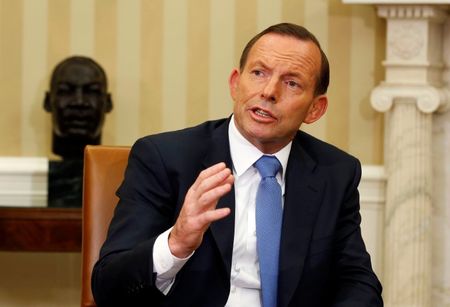By Matt Siegel
SYDNEY (Reuters) - Australia's conservative government may seek to bypass the Senate if its unpopular budget measures remain stalled in the chamber, Treasurer Joe Hockey warned on Wednesday, as a showdown festers over its foundering austerity agenda.
Prime Minister Tony Abbott's Liberal-National coalition has a decisive majority in the lower house, but needs the support of senators from the Palmer United Party (PUP) of mining magnate Clive Palmer's in the upper house to pass legislation.
The government on Tuesday took the rare step of extending the Senate's sitting hours in the hope of pushing through a raft of major legislation before Parliament breaks on Saturday for five weeks.
"I think it's bluster but it's largely for popular consumption," Peter Chen, a professor of politics and public policy at the University of Sydney, told Reuters.
"Basically what he's saying is, 'If there are uncommitted funds, we won't spend them.' That's the only administrative route he has to save money, which is obviously the worst way to run a government. It's not kind of grown-up government at all."
But while some measures should pass before the break, nearly all the spending cuts proposed by the government in a tough budget handed down in May remain in limbo amid fierce opposition in the Senate, which the government does not control.
That puts the conservative government in the awkward position of being unable to cut spending in some areas even as it pushes through spending rises elsewhere in its agenda, potentially increasing the deficits it campaigned against.
"If the Senate chooses to block savings initiatives then we need to look at other savings initiatives that may not require legislation," Hockey told Australian Broadcasting Corporation radio in an interview.
Among the savings measures now held up are the introduction of fees for doctors' visits, changes to the welfare system that would deny unemployment benefits to under-30s and cuts to family tax benefits.
Australia has fared better than most developed nations in the past decade, having avoided the implosions of the finance and housing sectors seen in the United States and Europe on the back of soaring Chinese demand for its natural resources.
But the government argues that 22 years of unbroken economic growth has been squandered on a bloated bureaucracy and tax breaks for the wealthy rather than investing in the infrastructure now so badly needed in many regions.
Among the budget measures, key agenda items, such as the repeal of the country's controversial carbon and mining taxes, remain stuck in the unruly upper house, which Abbott had previously warned he would dissolve in case of deadlock.
The opposition gave little sign it would back down, however, arguing that the government should make its case for the unpopular budget to the Australian people.

"If the Treasurer thinks he can sneakily get his changes through by somehow avoiding the parliament well he should explain to the Australian people what he's planning, instead of the normal bluff and bluster we're get from this guy," Shadow Treasurer Chris Bowen told ABC.
(Editing by Clarence Fernandez)
